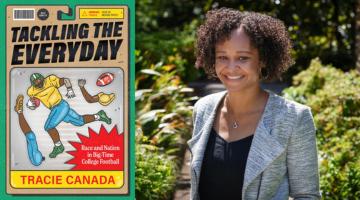BAR Book Forum: Tracy Sharpley-Whiting’s “Bricktop’s Paris“ and Magdalena J. Zaborowska’s “Me and My House”
Our authors explore the Black experience in Europe, past and present, and mine the deep reservoir of wisdom that is James Baldwin.
In this series, we ask acclaimed authors to answer five questions about their book. This week’s featured authors are T. Denean Sharpley-Whitingand Magdalena J. Zaborowska. Sharpley-Whitingis Gertrude Conaway Vanderbilt Distinguished Professor of French and African American and Diaspora Studies at Vanderbilt University. Her book is Bricktop's Paris: African American Women in Paris between the Two World Wars.
Zaborowska is Professor of Afroamerican and American Studies and the John Rich Faculty Fellow at the Institute for the Humanities at the University of Michigan.Her book is Me and My House: James Baldwin's Last Decade in France.
Tracy Sharpley-Whiting’s Bricktop’s Paris
Roberto Sirvent: How can your book help BAR readers understand the current political and social climate?
“Today’s Europe is very different from the interwar years—openly hostile, inhospitable, and terribly xenophobic.”
Tracy Sharpley-Whiting: The book deals with the migration of black women to Paris in the interwar period (between the first and second wars in the 20thcentury). France, particularly Paris, was considered a very hospitable place for black women to pursue their dreams of becoming artists, writers, to forge political alliances, and/or merely live freely unfettered by race-gender, as these women had dealt with the sometimes, murderous discrimination at home in the US. I don’t necessarily know if the same impulses exist among African American women today to migrate/expatriate—even temporarily to France—but it seems we are in another interesting period of migration, of African women, in particular, from West African countries, notably, Nigeria, who are searching for economic opportunities in Europe and finding less than optimal conditions. Most of these economic migrants are ensnared in sex trafficking—meeting a need that Europe itself wants to deny culpability in cultivating. Today’s Europe is a very different Europe—openly hostile, inhospitable, and terribly xenophobic. Given the history of Europe’s underdevelopment of Africa, I consider this migration a forced one as well though many social scientists and the average European would like to view the migration as a purely voluntary one. One also has to account even today for the ways in which African Americans in Europe have very different social-cultural capital than others of the diaspora.
What do you hope activists and community organizers will take away from reading your book?
I would hope one would see the forging of diasporic alliances at work. While many of the women were creative types in the traditional sense of arts and letters and Paris allowed them to develop their talents without constraint—except for monies—they were also very much involved in international networks and a Black Internationalist project. And when they returned to the US, many like, say Augusta Savage, Selma Burke, and Gwendolyn Bennet, sought to create art programs in their communities, in HBCUs, giving back what they learned in Europe, bringing those networks into contact and common cause with Blacks in the United States. What they continue to teach us is art and literature are political, are catalysts for social change.
We know readers will learn a lot from your book, but what do you hope readers will un-learn? In other words, is there a particular ideology you’re hoping to dismantle?
That France was/is colorblind. And that the African American storyisthe story of Black folks in the context of France and Europe, in general. It is very easy to get swept up into that notion. I recently read a story from an African American writer in the New York Times about Paris/France as a safe haven for African Americans, etc. It was highly nostalgic, the romanticized vision of France, without accounting for then and now French imperialism, its “civilizing missions,” slavery, etc. I so wanted to send the author a copy of God’s Bits of Wood, the film Black Girl as well as Aimé Césaire Discourse onColonialism. Again, the tendency is to not carefully scrutinize the African American experience as unique in comparison to those who have lived under the boot of French oppression.
Who are the intellectual heroes that inspire your work?
Of course, as an organic intellectual, Ada “Bricktop” Smith was a major inspiration for the work—as were the other black women discussed therein like Martinicans Paulette and Jane Nardal. But so was Du Bois who was eager to experience the world and France meant something special to him, in particular. I think David Levering Lewis and Thadious Davis really know how to tell a story so I found great inspiration in their critical biographies. I didn’t come to the research and writing thinking I’d find Josephine Baker intellectually inspiring. Interesting. Creative. A woman who pushed the envelope of sexuality. All of that—yes. We are from the same city—Saint Louis. So, there was a connection already there. But the more I researched her, the more I realized the depths of her anti-racist commitments once you got past the banana skirts.
In a broader frame of my intellectual heroes, I am quite taken with historians—even if Césaire called them novelists of history. Darlene Clark Hine, Gwendolyn Midlo Hall, and Pierre Nora; among them, as well as Aimé Césaire, Jacques Derrida, Alexandre Dumas, Euzhan Palcy, Ousmane Sembene, and the Walters—Rodney and Mosely.
In what way does your book help us imagine new worlds?
The book allows you to travel in place, I think. You can imagine these communities; Paris as a center for the Black diaspora in the interwar period. It’s a very productive time for black intellectuals. Politically, they were in Europe challenging colonialism and imperialism just after peace meetings in Versailles. Artistically, they were throwing down the gauntlet around representation, aesthetics, and blackness—all of which are politically-laden. They were thought of as dangerously internationalist. What a compliment! Their concerns about European empire-building, their desires to reclaim African art (primarily from West Africa) as aesthetically on par with that of the old European art masters troubled ideologies of racial, political, and cultural superiority tied to anti-Black racism. These were heady times and I absolutely understand why that New York Times writer was nostalgic at least for the robustness of the international exchange. And yes, a different sense of freedom. He was and would never be in danger of being gunned down by the police, accosted at restaurants, etc. In France, those are the privileges of Americanness. It can be exhausting to always live on guard. And yet, we can’t allow that freedom to cloud the real of the banlieue, of the béké class in Martinique, etc. But I do think everyone deserves to have certain aesthetic, indeed, human experiences. I think the book allows the reader to imagine the power of place is remarkable. My hope is we continue to be bold and internationalist in our visions of Black freedom struggles, that we travel to experience the power of place.
Magdalena J. Zaborowska’s Me and My House
“This book shows Baldwin as an ancestor and teacher, and as an elder whom we might finally be ready to embrace.”
Roberto Sirvent: How can your book help BAR readers understand the current political and social climate?
Magdalena J. Zaborowska: Me and My House tells the story of the genius that was James Baldwin and brings its readers closer to his fierce individuality, his passion for social justice, and his deep concern for the national house, or as he used to say, “these not so united states.” Baldwin knew well that being splintered and divided pervaded American historic reality. Separating families, selling children or parents away by slaveowners, yanking kids out of their mothers’ arms to take them to boarding schools where being Lakota or Sioux was beaten out of them comprised the tragic experience of Native peoples, African Americans, and some immigrants. Astonishingly and perversely, it is being justified to this day as pious and righteous because of some mythic notion of American “greatness.” More than ever, we must remember now that “we are history,” as Baldwin claims, and that we must face the reality of the current administration’s gleeful embrace of dictatorial, white supremacist rule. Such rule demands and thrives in divided societies, and if needed, creates their divisions by means of inadequate educational systems and disinformation campaigns that foster ignorance and fear, and that demonize whoever the regime would like to serve as the “other” of the moment in order to manipulate voters.
What do you hope activists and community organizers will take away from reading your book?
I hope that my book makes James Baldwin more accessible and approachable as a human being, and as someone who shared our longing for a safe place we could call home. It shows him as an ancestor and teacher, and as an elder whom we might finally be ready to embrace and from whom we might finally learn the hard truth about who we are as Americans of all hues, identities, and persuasions. Had he lived today, he would have been talking about current erasure of democracy and vengeful return of nationalism and xenophobia all over our world. He would be reminding us of the thousands of black and brown bodies floating dead in the Mediterranean, reenacting for a new century, and new geopolitics, a ghastly version of the Middle Passage. He would have led marches and spoken to encourage the brave teenagers who protest against gun violence in schools and cowardly submission and hypocrisy of politicians taking money from the NRA.
I would like the activists and organizers to turn to his writings and his revolutionary humanism, to mine his wisdom, and take it to all those who have not found it yet. (A word of caution: Reading Baldwin in the age of sound bites, even shorter attention spans, and dictatorship of the selfie requires serious work and intellectual willingness to be challenged, if not changed. You cannotencapsulate any of his ideas in 140 characters; you have to fight for who you can become thanks to his literary witnessing. That’s what great literature has always done, and that’s why we find his writings so relevant to our racially and politically troubled moment today.)
“Had he lived today, he would have been talking about current erasure of democracy and vengeful return of nationalism and xenophobia all over our world.”
If I could bring Baldwin’s domestic life and creative strivings closer to activists and organizers, I’d be thrilled, for I believe that we take courage and learn from material circumstances of the lives we admire. My research has also helped me see that, no matter how many solitary hours he spent wrestling with his writing, Baldwin needed and relied on other people to be there so he could accomplish his work. Many of those who helped and inspired him were women, some magnificent and very famous like Maya Angelou, Nina Simone, Lorraine Hansberry, or Josephine Baker. Many we have never heard of, and so I describe a few of them in my book. They were his teachers, friends, protectors, and confidantes, like Yvonne Roux, who listened to him read his work out loud and advised him how to shape the voice of a nineteen-year old black pregnant woman in his 1974 novel, If Beale Street Could Talk; she translated his 1960’s play, Blues for Mister Charlie into French; she always heard out his frequent love trouble. A white female schoolteacher, whom he lovingly remembers as “Bill” Miller, first encouraged him to read and write; a cook whose name was Valerie prepared great meals for him and his entourage at his house, while Yvonne’s little daughters, Pitou and Hélène, treated his abode as their own and the man as family. There was also a Muslim worker, who appears in his last unpublished play as “Mohammed,” and who took care of his gardens and orchard, and about whom he hoped to write a book called No Papers for Mohammed, and many others.
I say all of this to the politically engaged young people, who are our only hope to right this world (my son Cazmir is among them), to remind them that Baldwin would have wanted them to embrace coalitions and not exclude anybody who would aid them, no matter their gender, race, religion, sexuality or social and citizen status.
We know readers will learn a lot from your book, but what do you hope readers will un-learn? In other words, is there a particular ideology you’re hoping to dismantle?
Very much so! Like Baldwin I believe in familial ties binding all people and thus giving us tremendous power. Please, know that this is not some superficial Kumbaya statement but another acknowledgement of the hard lessons about our humanity that he has forged for us. He called this power “love” or “saying yes to life”; at times, he called it “battle” and “war” or a “growing up.” Most important, he always acknowledged how hard it was to embrace such an approach – as hard, indeed, as embracing all of humanity the way each of us longs to be seen and held – a whole person at a time. Yet he insisted that it was the only one that could bring about lasting change. He writes in his last published essay, “To Crush the Serpent,” “Complexity is our only safety and love is the only key to our maturity. And love is where you find it.”
Born black and queer, and in dire poverty, Baldwin experienced the injustices of the U.S. national house acutely and personally, and wrote about them courageously and brilliantly. He was often derided for doing so on both sides of the color line, where his being out as homo- and bi-sexual was not rewarded. As he reminded his beloved younger brother David once, he never “kissed ass,” and chose to relentlessly witness facts and tell most inconvenient truths, including those about himself.
“He never ‘kissed ass,’ and chose to relentlessly witness facts and tell most inconvenient truths.”
In light of this, then, if your group’s or movement’s identity is based on excluding someone else, the way that black nationalists in U.S., and Solidarity leaders in Poland (where I grew up) kept women and queers and trans folk out of sight and silent, for example, then you are not really democratic and you are not really fighting for equality. As with sexism, homo- and trans-phobia, or classism, please, know that racism never works alone, and you cannot have your cake and eat it. So, yes, and always yes, to #BlackLivesMatter but no to excluding people from events, victimizing them for their art or speaking out because of what they look like, what language they speak or don’t, how they gender-identify, where they are from, not to mention whom they love.
Who are the intellectual heroes that inspire your work? In what way does your book help us imagine new worlds?
In addition to Baldwin, who shall forever remain number one, I’ve always admired the works of Ann Petry and Gwendolyn Brooks, brave and relentless in probing the ways in which racism has been shaping Americans of all hues and social standings. The bold takes on love, eroticism, and female warriors by Wonder Women Audre Lorde and Adrienne Rich were early inspirations, and so were the works of Gish Jen, Toni Morrison, Maya Angelou, and Alice Walker, as well as those by several Jewish women I write about in my first book – Mary Antin, Anzia Yezierska, and Eva Hoffman. Octavia Butler’s, Louise Erdrich’s, and Jeanette Winterson’s novels have been constant companions in recent years, as have been those by Zadie Smith, Caryl Philips, or Zofia Naukowska, Chimimimanda Ngozi Adichi, and Olga Tokarczuk. As you can see, I consider writers the intellectuals of the highest order, while I also acknowledge the influence of more academically oriented ones like Edward Said, Julia Kristeva, Eve Sedgwick, Paul Gilroy, Barbara Christian, or Stuart Hall. There are simply too many to name…
In what way does your book help us imagine new worlds?
I love this question and thank you for giving me a chance to answer it, though I am not exactly sure how to do so ... I think many of us dream of new worlds or of the new us (and U.S.), but only some of us have the courage, strength, and imagination to truly work on and fight for these things as leaders. As I write in My and My House, despite his frail health and small frame, Baldwin was a giant of a fighter and leader, and has left us a legacy worth defending and passing on to the next generations. What he has taught me, to wax personal for a moment (but also to admit that this book is very important to me), has been imprinted on how I live and how I imagine a future that Cazmir and his peers will build, it throws shade on who I love, and how I see myself and others. For what has really saved my life, as Baldwin would have put it, is the realization that anything important and worth having requires a lot of work and total commitment, and that most of the time we are loathe to do it. Like all of us, I’ve had my failures and some triumphs; like all my teachers, heroes, and leaders, like Baldwin, most of all, I’ve believed that I can do it, that we all can do it, beginning with our own hearts and minds; that we can remake this world into a more just and humane place.
Roberto Sirvent is Professor of Political and Social Ethics at Hope International University in Fullerton, CA. He also serves as the Outreach and Mentoring Coordinator for the Political Theology Network. He’s currently writing a book with fellow BAR contributor Danny Haiphong called American Exceptionalism and American Innocence: A People’s History of Fake News—From the Revolutionary War to the War on Terror.
COMMENTS?
Please join the conversation on Black Agenda Report's Facebook page at http://facebook.com/blackagendareport
Or, you can comment by emailing us at comments@blackagendareport.com



















